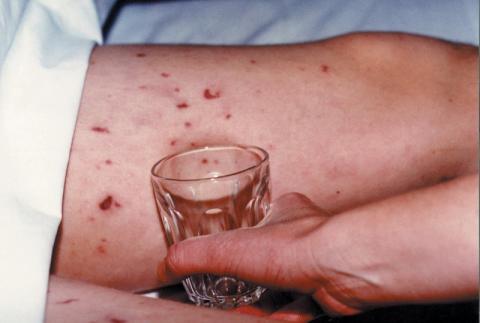Meningococcal Infection – St Patrick’s Primary, Legamaddy

The Public Health Agency (PHA) is investigating a suspected case of meningococcal infection involving a child who attends St Patrick’s Primary school in Legamaddy, near Downpatrick.
The PHA is working with the school to ensure all appropriate public health actions are taken. Letters and information leaflets about meningococcal infection are also being distributed to parents and staff at the school.
Public health actions are being taken in line with standard national guidance for identification of a single case in a school. Immediate family have been given preventive antibiotic medication.
We are aware of heightened levels of concern following the two cases of meningococcal infection in Our Lady and St Patrick Primary school in Downpatrick. However following a single case of the infection being identified in a school it is not normally necessary for children in the same class to receive preventive antibiotic medication and recent research has shown that many children carry protective bacteria in their nose and throat. Antibiotics can destroy these protective bacteria leaving healthy children more vulnerable to infection.
The PHA is working closely with both schools to investigate the cases and will continue to monitor the situation.
Dr Richard Smithson, Consultant in communicable disease control, PHA, said: “I would like to reassure the parents of the children who attend the school that the likelihood of further cases at the school is low but, in line with standard national advice, immediate family of the child have been provided with antiobiotics. The risk to the wider community is extremely low.
“It is important that people can recognise the signs and symptoms of meningococcal infection so that they can be alert and seek medical help immediately if they suspect someone of having the symptoms.”
Meningitis is most commonly caused by the meningococcus bacterium. It causes inflammation of the brain lining and/or septicaemia (blood poisoning). Infection can occur at any age, though the majority of infections occur in children under four years old. Teenagers are also a particularly vulnerable group.
Early symptoms of the disease may include:
• sudden onset of high fever;
• a severe and worsening headache without any other obvious cause;
• severe neck stiffness;
• dislike of bright lights;
• very cold hands and feet;
• drowsiness that can deteriorate so someone is difficult to wake or even unconscious;
• a rash that does not fade when pressed with a glass (this is due to bleeding under the skin).
Babies with meningococcal disease tend to be irritable when picked up and have a high pitched cry, stiff body and jerking movements.
Dr Smithson added: “Symptoms of meningitis are often non-specific and easily mistaken for other illnesses such as flu, but the disease can come on very quickly and it is important to seek urgent medical attention if you think meningitis is occurring.
“A very important sign is a rash which does not disappear if a glass is pressed against it. If someone develops this then they need urgent medical attention. It can appear anywhere on the body so it is important to check under clothing. However the rash doesn’t always appear, so don’t wait for it to appear before seeking medical attention if other signs are present.”
Meningitis is the inflammation of the linings of the brain and spinal cord, while septicaemia is the blood poisoning form of the disease. These two conditions have different sets of symptoms and may occur separately or together.
Healthcare staff in primary and hospital settings, both in and out of hours, have been advised.
Further information on meningococcal infection can be found on the Health Protection Agency website: http://www.hpa.org.uk/Topics/InfectiousDiseases/InfectionsAZ/MeningococcalDisease/GeneralInformation/meninMeningococcalfactsheet/ or http://www.meningitis.org/assets/x/52208
Ends
Contact the PHA Press Office on 028 9031 1611
- There are approximately 60-70 cases of meningococcal infection each year in NI.
- Due to patient confidentiality and the duty to respect an individual’s privacy, the Public Health Agency is not in position to release personal information.
- Arrangements have been put in place for all children who attend Our Lady and St Patrick primary school to receive antibiotics on Monday 25 June and Tuesday 26 June to reduce the risk of further infection. All staff at the school are also being offered antibiotics. This action is being taken as a precautionary measure and is in line with standard national guidance.
Meningitis symptoms in babies are:
- High temperature, fever, possibly with cold hands and feet
- Vomiting or refusing feeds
- Baby may be floppy, dislike being handled
- High pitched moaning, whimpering cry
- Difficult to wake or lethargic
- Non-blanching rash (doesn’t disappear when a glass is pressed against it)
Meningitis symptoms in adults and children are:
- High temperature, fever, possibly with cold hands and feet
- Vomiting
- Neck stiffness
- Non-blanching rash (doesn’t disappear when a glass is pressed against it)
- Drowsiness
- Dislike to bright lights
- Joint or muscle pain
- Fits
